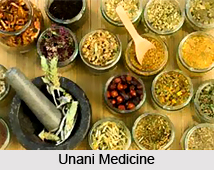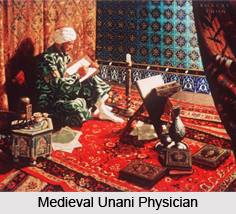 Unani medicine was introduced in India in the 12th century A.D. Through years it has undergone substantial progress owing to the efforts of various practitioners and scholars known as tabibs and hakims. Once it was considered as one of the most prominent system of medicines in the country. This system of medicine spanned through the different parts of the country and has utilized India`s rich heritage of indigenous medicines and herbs. Unani medicine has also hugely influenced the other systems of medicine in the country. In the medieval era, people of the country had a strong faith over Unani system of medicine.
Unani medicine was introduced in India in the 12th century A.D. Through years it has undergone substantial progress owing to the efforts of various practitioners and scholars known as tabibs and hakims. Once it was considered as one of the most prominent system of medicines in the country. This system of medicine spanned through the different parts of the country and has utilized India`s rich heritage of indigenous medicines and herbs. Unani medicine has also hugely influenced the other systems of medicine in the country. In the medieval era, people of the country had a strong faith over Unani system of medicine.
Introduction of Unani Medicine in India
Khusro Malik who was the son of the last Ghazini king, Khusro Shah was a great follower of Unani medicine. He set up the first centre of Unani Medicine in India with the help of his court physician, at Lahore.
Unani Medicine in Slave Dynasty
Unani medicine flourished greatly during the rule of Sultan Iltutmish of Slave Dynasty. A number of physicians and practitioners emerged during this period and set up their own clinics. These practitioners were also eminent teachers of this discipline and also wrote several texts on Unani medicine. Their popularity increased with time and students from different parts of the country came to Delhi to become adept Uniani medicine practitioners. The teachers were known as Hakims who used to train a set of students in their clinic. Being the capital state, Delhi soon gathered a number of proficient physicians who were famed throughout the country.
 Unani Medicine in Khilji Dynasty
Unani Medicine in Khilji Dynasty
Ala-ud-din Khilji was the patron of Unani medicine in Khilji Dynasty. Despite of being a ruthless ruler, he was renowned for his efficient administration. Along with various scholars of his kingdom, he worked for the development of Unani medicine. The notable physicians of Khilji dynasty who were notable in the field of Unani medicine are Meh Chand, Hissam al-Din Marikali, Maulana Hamid Mutriz and many more.
Unani Medicine in Tughlaq Dynasty
Muhammad Bin Tughlaq, the ruler of Tughlaq Dynasty, was well known for being a scholar having an abyss of knowledge in the fields of medicine, astrology and mathematics. He was also famed for diagnosing patients efficiently. He had a deep admiration for the scholars and physicians and had worked a lot in the development of Unani medicines. Historical records have furnished a manuscript of Unani medicine that was prepared during the reign of Muhammad Bin Tughlaq.
Unani Medicine in Lodhi Dynasty
Sultan Sikandar Lodi was the emperor of Lodhi Dynasty who greatly admired the scholars and took a keen interest in their work. Practice of Unani Medicine was greatly encouraged during the time of Sultan Sikandar Lodhi and the emperor himself gave grants to provide recognition to the dexterity of the practitioners. During this period, many books pertaining to Unani Medicine were also written.
Unani Medicine in Mughal Dynasty
 Unani Medicine had also achieved remarkable progress during the Mughal Dynasty. Adept physicians from different regions were invited by the Mughal Emperors for the growth and expansion of this system of medicine. Throughout the Mughal rule, all the emperors took a deep interest in this discipline and consequently many practitioners emerged. By this time, this system of medicine was also widely accepted and trusted in the society. Several clinics and hospitals were established which provided excellent treatments for a number of ailments. Notable physicians of this period who practiced Unani Medicine are Hakim Fathullah Gilani, Hakim Muhammad Amin Gilani, Hakim Musammat Sati Al-Nisa, Hakim Sadra, Hakim Abul Fath Gilani and many more. Several medical books were also written by these physicians including Shifa-ul-Famil, Ujala-e-Nafia, Tuhfa-e-Alamshahi, Talif-e-Sharifi etc.
Unani Medicine had also achieved remarkable progress during the Mughal Dynasty. Adept physicians from different regions were invited by the Mughal Emperors for the growth and expansion of this system of medicine. Throughout the Mughal rule, all the emperors took a deep interest in this discipline and consequently many practitioners emerged. By this time, this system of medicine was also widely accepted and trusted in the society. Several clinics and hospitals were established which provided excellent treatments for a number of ailments. Notable physicians of this period who practiced Unani Medicine are Hakim Fathullah Gilani, Hakim Muhammad Amin Gilani, Hakim Musammat Sati Al-Nisa, Hakim Sadra, Hakim Abul Fath Gilani and many more. Several medical books were also written by these physicians including Shifa-ul-Famil, Ujala-e-Nafia, Tuhfa-e-Alamshahi, Talif-e-Sharifi etc.
Unani Medicine in Medieval Age had witnessed great progress. The system of medicine was tremendously encouraged by the rulers in the medieval age. Immense support and grants were conferred on the practitioners to develop Unani medicine which gradually emerged as the most effective and trusted system of medicine in the society. It became popular in the whole country and maintained a strong grip even after the downfall of Mughal rule.




















